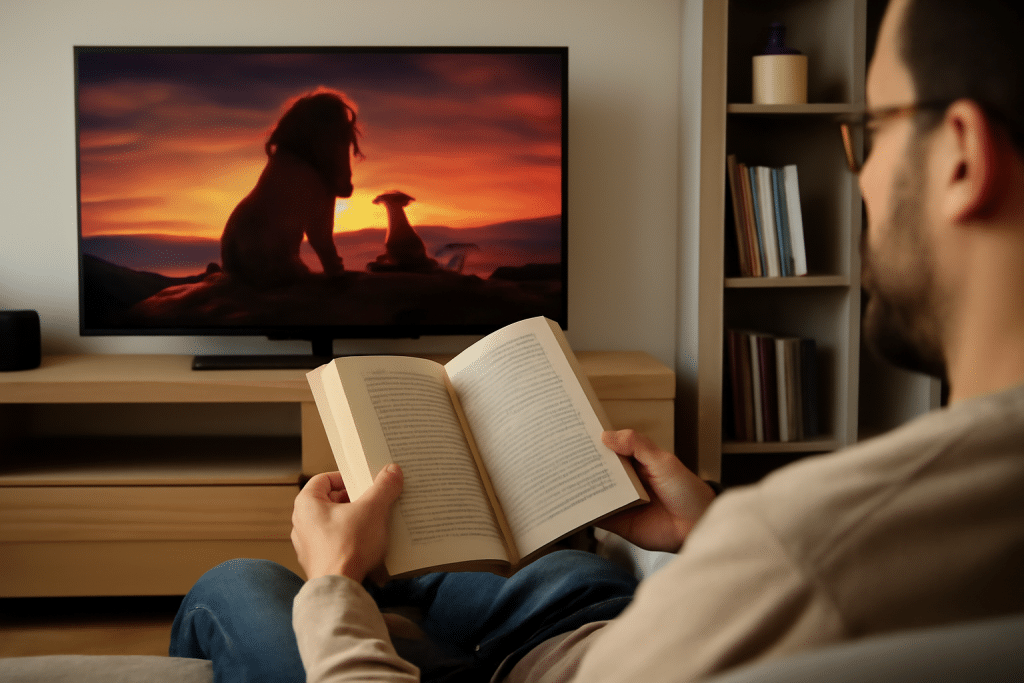Why People Rewatch, Reread, and Repeat
Samantha Lee July 21, 2025
Ever wondered why you always end up rewatching that classic movie or rereading your favorite novel? It’s not just nostalgia. People are increasingly drawn to the comfort and familiarity of repetition. Whether it’s TV shows, books, or even old songs, something about revisiting the past keeps us coming back for more. But what’s really behind this phenomenon?

1. Comfort in Familiarity: The Psychological Need to Repeat
The first reason people rewatch, reread, or repeat activities is the psychological comfort of familiarity. Research shows that our brains are wired to seek comfort in the known. It’s a simple but powerful survival mechanism: when something feels safe and familiar, it reduces anxiety and stress. Watching a favorite movie or rereading a beloved book can offer a brief escape, providing a comforting routine in an unpredictable world.
This is especially true in times of uncertainty. With the rise of global crises and daily stresses, turning to familiar content offers a sense of control. People often turn to shows like Friends or The Office, because they know exactly what to expect. It’s like visiting an old friend – you don’t have to learn anything new, and it’s reassuring.
Studies have shown that familiarity activates the brain’s reward centers, releasing feel-good chemicals like dopamine. This “feel-good” effect creates a loop where the more we repeat the experience, the more we want to repeat it again (Schultz 2015).
2. Cognitive Benefits: Rereading and Rewatching Helps Us Learn
It’s not just about comfort. Rewatching or rereading can actually make us smarter. According to psychologists, revisiting content helps us absorb details we missed the first time around. Whether it’s the plot twists in a movie, the subtle nuances in a novel, or even learning from a podcast, repetition strengthens memory and comprehension. Repeated exposure allows us to recognize new patterns and understand deeper meanings.
For example, people don’t just watch Breaking Bad multiple times because of nostalgia. They’re also uncovering new layers of the show with every repeat. By the third or fourth viewing, viewers notice foreshadowing, character development, and thematic elements that were missed the first time around. The same applies to books – reading a classic novel like Pride and Prejudice over time reveals more about its characters and cultural context each time. The brain benefits from the cognitive engagement that repetition provides.
In fact, a study from the University of California found that rereading books, particularly those that are complex or dense, helps build a deeper understanding of the content, encouraging critical thinking (Jensen 2017).
3. Nostalgia: Reliving the Magic of the Past
Nostalgia is another driving factor behind our love for repetition. It taps into our emotional side, allowing us to relive memories and experiences from our past. Rewatching The Lion King or reading Harry Potter series takes us back to our childhood, evoking emotions we associate with simpler times. This nostalgic longing can be an extremely powerful motivator.
Moreover, nostalgic content doesn’t just help people reminisce – it also strengthens bonds. For example, watching a favorite childhood movie with your family or rereading a book that you loved during your teen years can create a sense of shared experience, even if you’re watching or reading it alone. Nostalgia works like a time machine, taking you back to the past while reinforcing the emotional connection with the content (Routledge et al. 2013).
4. The Power of Fandom: Building Communities Around Repeated Experiences
For many, the act of repeating content goes beyond personal enjoyment. It’s also about being part of a community. Fandoms form around rewatched TV shows, reread book series, or even video games, where fans engage in discussions, fan theories, and fan-made content. This sense of community is strong in franchises like Star Wars, Marvel, or Harry Potter, where fan engagement continues even years after the original content was released.
Rewatching the same content allows individuals to bond over shared experiences. Whether through online forums, social media groups, or fan conventions, these communities thrive on repeated engagement with content. It’s a way for fans to stay connected, discuss interpretations, and explore the content in fresh ways. The fandom around Game of Thrones, despite its controversial ending, remains one of the strongest examples of how repetition fosters lasting fan relationships.
5. Escape and Self-Soothing: Repetition as a Coping Mechanism
For many, repetition is also a way of coping with stress, sadness, or anxiety. It offers an emotional escape, providing a safe space to retreat to when life becomes overwhelming. Rereading a beloved book or rewatching a favorite show doesn’t require much mental effort. It’s predictable, and there’s little chance of emotional discomfort because viewers already know how it ends.
This is especially common in young adults and millennials, who often use TV shows like The Office or Parks and Recreation to unwind. These shows are lighthearted and easy to follow, offering a comforting routine when needed most. They are, in many ways, emotional security blankets.
6. The Rise of Streaming Services: Unlimited Access to Repeats
In today’s digital age, the accessibility of content is unprecedented. Streaming services like Netflix, Hulu, and Disney+ have made it easier than ever to revisit old favorites. With the ability to watch, reread, or re-listen to your favorite content at the touch of a button, the barrier to entry is lower than ever.
Furthermore, the design of these platforms encourages repetition. With algorithms that suggest content based on what you’ve watched before, it’s easy to fall into a cycle of watching the same shows or movies over and over again. Some platforms even suggest content based on your viewing habits, making it even easier to get sucked back into familiar content.
Conclusion: Repetition Is a Powerful Tool
The reasons behind why people rewatch, reread, and repeat are diverse but deeply rooted in our psychological needs. From comfort to cognitive benefits, nostalgia to community building, repetition provides emotional and intellectual rewards. In today’s world, where stress and uncertainty dominate, having access to a comforting and familiar escape can be invaluable.
So the next time you find yourself rewatching Friends or rereading The Great Gatsby, know that you’re not alone. It’s a universal experience grounded in the human need for connection, comfort, and understanding.
References:
- Jensen, A. (2017) Learning Through Repetition: The Power of Rereading. Educational Psychology Review. Available at: https://link.springer.com (Accessed: 21 July 2025).
- Routledge, C., Arndt, J., and Sedikides, C. (2013) ‘The Power of Nostalgia: Exploring the Emotional and Psychological Benefits of Revisiting the Past’. Journal of Social and Personal Relationships, 30(8), pp. 1084-1101. Available at: https://journals.sagepub.com (Accessed: 21 July 2025).
- Schultz, W. (2015) ‘Neural Mechanisms of Reward and Decision-Making’. Current Opinion in Behavioral Sciences, 5, pp. 6-11. Available at: https://www.sciencedirect.com (Accessed: 21 July 2025).







